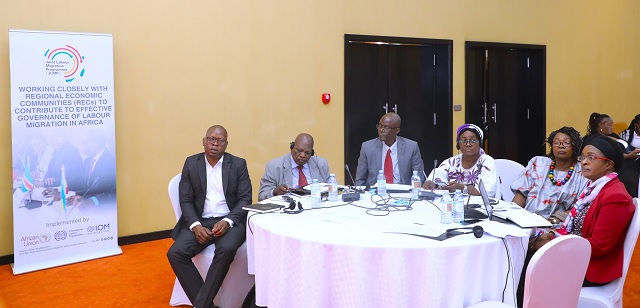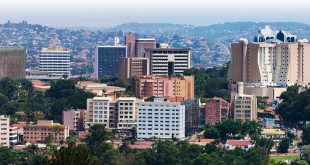
Kampala, Uganda | THE INDEPENDENT | The African Union (AU) has urged governments on the continent to prioritize workplace fairness in bother public and private entities. AU’s Programme Coordinator, Odette Sarr Bolly, said every government and workers’ organizations should promote inclusive and progressive employment practices and fairness at places of employment.
Odette was today addressing participants of the three days regional tripartite conference on labour migration in Economic Community for Central African States (ECCAS) and Common Market Eastern and Southern Africa (COMESA) under “Synergies for Improved Labour Migration Governance.”
“Collaboration among governments, workers, employers is essential to address the multifaceted nature of labour migration. Employers’ organization play a key role in defining standards and guidelines for the mutual recognition of skills, including those acquired informally. Workers organizations play an active role in promoting the rights of workers and addressing vulnerabilities,” Odette said.
Uganda’s Minister of State for Labour, Employment and Industrial Relations, Esther Anyakum Davinia, said youth migration to overseas for work is a concern that should be addressed through skilling that can enable them venture into income generating entrepreneur initiatives.
“The majority of the migrant workers who go overseas to work are mostly youth. Findings from the Uganda Bureau of Statistics have helped the Government of Uganda to refocus on skilling the youth through various programs and initiatives so that they are able to venture into entrepreneur initiatives and engage in other productive ventures. This is because labour migration was instituted by the Government of Uganda as a temporary measure to curb unemployment among the youth of Uganda,” Anyakum said.
Anyakum added that Uganda is already in the process of signing the protocol of Free Movement and Transhumance of persons in the IGAD region with the other seven member states of IGAD so that there are no restrictions on the movement of migrant workers in the region, with the COMESA and ECCAS therefore, this will be a very good opportunity for our migrants to freely move and work in these regions without any difficulties.
Uganda on April 2, 2024 signed a Bilateral Labour Agreement with Qatar as a mechanism of ensuring safe labour migration of the migrant workers which makes a total of five agreements. According to Anyakum, Uganda aims at having as many agreements as possible with counties the Gulf Cooperating Countries and beyond.
Elhadj Sanusi Tejan Savage, the Chief of Mission International Organization for Migration’s (IOM) Uganda, rallied the participants to remember that Africa is home to an increasing number of labour migrants.
Quoting the Third edition of the Africa Labour Migration Statistics Report of 2019, Savage reminded leaders in both public and private institutions to remember that there is an estimated 14.5 million international labour migrants on the continent. “This number had increased from 9.5 million in 2010, representing an average annual growth rate of 4.8 per cent. This calls for appropriate labour migration and labour policies that ensure the continent’s ability to meet the demand for jobs,” Savage said. Odette explained that well managed migration requires a holistic and balanced approach which takes into account the rights, needs, and aspirations of migrants, while also addressing the concerns and interests of host communities and countries of origin.
“For this to be achieved, there must be cooperation and partnership among countries of origin, transit, and destination, as well as with relevant stakeholders such as civil society, international organizations, and the private sector. That is why we have carefully selected participants for this meeting,” Odette said.
Odette told stakeholders that the African continent counts on their contributions towards developing and implementing comprehensive, coherent and coordinated approaches to labour migration based on the international principles and standards.
“Ensure decent work and social protection for all migrant workers, irrespective of their status; facilitate fair and ethical recruitment and prevent exploitation and abuse; enhance the contribution of labour migration to inclusive growth and sustainable development,” Odette said.
Stephen Opio, the Head of Advocacy at International Labour Organization (ILO) noted addressing issues of labour migration needs fostering social dialogue and cooperation among governments, employers and workers’ organizations, and other pertinent actors; and promote policy coherence and coordination at the national, regional and global levels.
******
URN
 The Independent Uganda: You get the Truth we Pay the Price
The Independent Uganda: You get the Truth we Pay the Price


